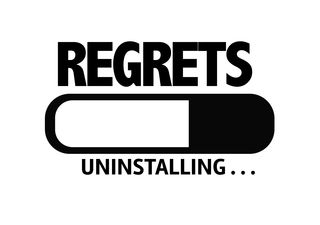
Gratitude
Making Peace with Past Mistakes
Should we be letting past mistakes define who we are?
Posted May 28, 2018

One of the most horrible nightmare experiences I ever heard of was that of a young mother who, in her dream, had oven-roasted and eaten her baby girl. She was totally shocked and horrified by what she’d just done in her dream. Who wouldn’t be?
Yes, it was only a dream. But to her, nothing could be more real. She was fully experiencing the range of intense thoughts, emotions and physical reactions an average person would after realizing they’ve eaten their baby. The nightmare was over but she hadn’t come out of it.
Coming Out of the Past
When it comes to our lives and past mistakes, a good place to start is to be thankful and grateful whenever those mistakes are not nearly as ugly as that nightmare.
What we now perceive as mistakes on our life trajectories may more simply be regretful choices, such as passing up on opportunities to study, work, play music, give more time, love or care to someone, nourish some ideal, get together with a partner or raise our children more sensibly.
Such "mistakes" are in fact choices, made consciously or not, which we now reassess in light of our current beliefs, levels of knowledge and accumulated wisdom.
In some cases, we may have to come to terms with truly horrific scenes from the past. There might be truly regrettable deeds to re-examine, such as conflicts associated with past addictions.
The intensity is different but the process is similar. Our minds are programmed to keep fragments of the dead past alive. We keep replaying scenes and even mentally rewrite scenarios to create more dramatic effects.
So how do we know what’s real and what’s not?
We keep nourishing our thoughts, some of which we were perhaps able to ignore for a while – until recently.
With repetition, negative thoughts grow in strength. They may become very potent as we age.
We cultivate regrets and experience distress. And we typically grow some form of hatred toward ourselves.
Now what do we do?
Past and Present
The past is gone and there’s nothing we can change about it. Our recurring experience with past mistakes is similar to being imprisoned in a nightmare. We' re not fully awake. We’re still in the dream.
By letting the mind constantly dwell on past mistakes we, somehow, become that terrible mistake. The more we dwell on it, the more we identify with it. We’ve become that mistake.
If we’ve once robbed a bank and from then on we keep thinking of ourselves as bank robbers, chances are we’ll repeat the action whenever the opportunity presents itself.
But fundamentally, are we really that which we’ve identified with? We often fail to realize we’re so much more than our past mistakes.
If we instead learn to think of ourselves as a worthy individual who was previously misguided and did something reprehensible, we can channel our thoughts and actions more positively.
We’re all free to do something good and valuable with our lives, starting right now.
Only the present offers an opportunity to choose an action. When our mind resides in the past, we miss opportunities – second by second – to pursue an ideal and be fully alive.
Let’s forgive ourselves and then we can seek opportunities to multiply our good deeds.
This column first appeared on Troymedia. © Nicole F. Bernier

